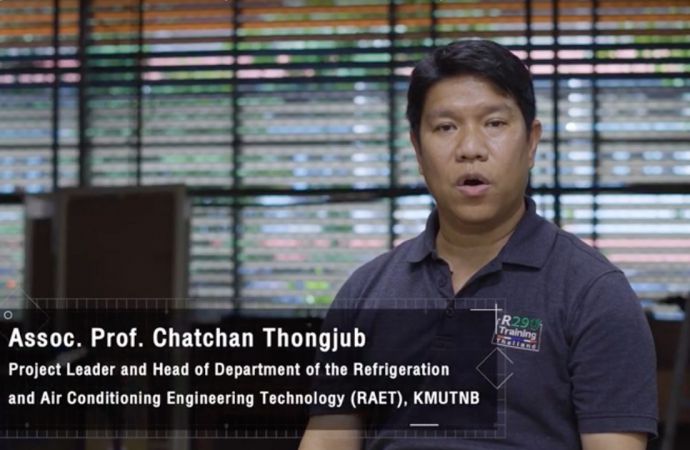The video looks at the RAC NAMA initiative’s first official R290 training event held last August.

Screenshot from GIZ Thailand YouTube Channel
A recently released video shows the on-the-ground impact that Thailand’s air conditioning and refrigeration initiative known as “RAC NAMA” is having on local trainers’ knowledge of R290 use in Thailand.
The video, released in both Thai and English on GIZ Thailand’s YouTube page, provides an in-depth look at the “Grand Opening of First R Training: Safe Use and Handling of Flammable Refrigerants” training program, which was held on August 19, 2019, at King Mongkut’s University of Technology North Bangkok (KMUTNB).
The training event – jointly held by KMUTNB, the Electricity Authority of Thailand (EGAT), and GIZ GmbH – marked the official start of a “training of trainers” series on the safe use of R290 in refrigeration and air conditioners in Thailand, including how to charge and vacuum a system. (See, “Training the Trainers on R290 AC in Thailand,” Accelerate Magazine, September 2019.) Training is mainly focused on the safe use of R290 in room air-conditioning applications.
The biggest benefit that they gain is they improve their knowledge vastly, specifically to do with hydrocarbon refrigerants.” - Tony Darlow, HEAT International
The training program is part of Thailand’s larger Refrigeration and Air-Conditioning Nationally Appropriate Mitigation Action (RAC NAMA) initiative which “aims to promote natural refrigerants for energy-efficient and climate-friendly cooling technologies in Thailand,” according to a statement released by GIZ Thailand.
KMUTNB, which serves as the main training center, will organize a total of six training courses that will be carried out at eight regional training centers throughout the country, according to Chatchan Thongjub, Associate Professor, Project Leader and Head of the Department of Refrigeration and Air Conditioning Engineering Technology at KMUTNB.
The courses will target university teachers, trainers from the Institute for Skill Development and vocational education teachers from all over Thailand. After the training, they will act as knowledge carriers to spread the knowledge about natural refrigerants throughout the country.
“R Training 2: Safe Use and Handling of Flammable Refrigerants” is currently being held from November 18 to 22 at KMUTNB.
Safety protocols and more
The training “focuses on natural refrigerant safety protocols,” said Thongjub. “The training also touches upon working regulations and the essence of welding and leakage testing; set up and servicing are also included in the curriculum.”
Proper brazing is one example of the practical exercises that is done in the training, said Tony Darlow, Senior Technical Advisor for HEAT International, a European independent consulting firm that provides technical advice, capacity building and training for the refrigeration and air conditioning industry.
“The biggest benefit that they gain is they improve their knowledge vastly, specifically to do with hydrocarbon refrigerants,” said Darlow. “But we also improve their skills and knowledge of refrigeration and air conditioning theory in general. We train and show them state-of-the-art-tools and equipment so [they can] produce better quality systems — no leakage, better systems, safer systems.”
The video features several locally based Thai instructors speaking about what they personally gained from the training session. “Before attending the training, I knew very little about flammable natural refrigerants,” said Tawatchai Jaruwongwittaya, Assistant Professor and Teacher of Refrigeration and Air Conditioning Engineering at Rajamangala University of Technology Isan. “However, after joining the training I learned that flammable refrigerants are being used more and more in this world.”
On November 19, the second day of “R Training 2”, Dennis Frieske, Senior Technical Advisor for HEAT International, remarked that he was very impressed by the motivation of the participants who conducted training exercises on brazing and handling of R290.
“They really tried to [braze] perfectly,” said Frieske. The skill levels of the participants varied widely, he added, though this did not affect their motivation. “When it was not perfect, they would do it over and over again. Tomorrow, I’m looking forward to the next exercises where we will charge some AC units and do [refrigerant] recovery. I hope to see the same results.”
For more about the RAC NAMA project and how it is kick-starting Thailand’s transition towards the use of natural refrigerants, see Accelerate Magazine November-December edition here.
Watch the full video below.
Related stories




